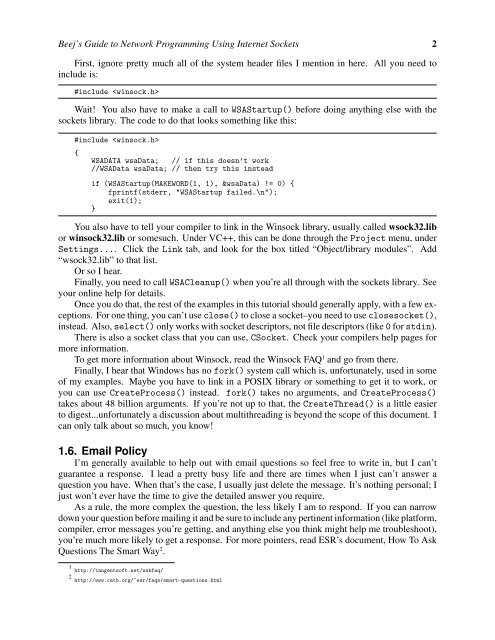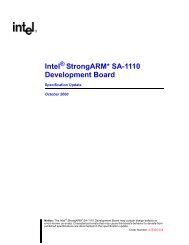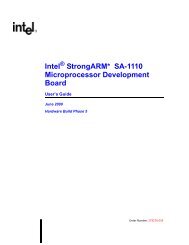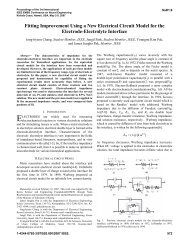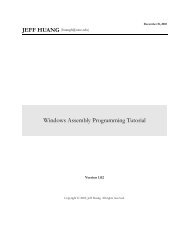Beej's Guide to Network Programming Using Internet Sockets
Beej's Guide to Network Programming Using Internet Sockets
Beej's Guide to Network Programming Using Internet Sockets
- No tags were found...
You also want an ePaper? Increase the reach of your titles
YUMPU automatically turns print PDFs into web optimized ePapers that Google loves.
Beej’s <strong>Guide</strong> <strong>to</strong> <strong>Network</strong> <strong>Programming</strong> <strong>Using</strong> <strong>Internet</strong> <strong>Sockets</strong> 2First, ignore pretty much all of the system header files I mention in here. All you need <strong>to</strong>include is:#include Wait! You also have <strong>to</strong> make a call <strong>to</strong> WSAStartup() before doing anything else with thesockets library. The code <strong>to</strong> do that looks something like this:#include {WSADATA wsaData; // if this doesn’t work//WSAData wsaData; // then try this insteadif (WSAStartup(MAKEWORD(1, 1), &wsaData) != 0) {fprintf(stderr, "WSAStartup failed.\n");exit(1);}You also have <strong>to</strong> tell your compiler <strong>to</strong> link in the Winsock library, usually called wsock32.libor winsock32.lib or somesuch. Under VC++, this can be done through the Project menu, underSettings.... Click the Link tab, and look for the box titled “Object/library modules”. Add“wsock32.lib” <strong>to</strong> that list.Or so I hear.Finally, you need <strong>to</strong> call WSACleanup() when you’re all through with the sockets library. Seeyour online help for details.Once you do that, the rest of the examples in this tu<strong>to</strong>rial should generally apply, with a few exceptions.For one thing, you can’t use close() <strong>to</strong> close a socket–you need <strong>to</strong> use closesocket(),instead. Also, select() only works with socket descrip<strong>to</strong>rs, not file descrip<strong>to</strong>rs (like 0 for stdin).There is also a socket class that you can use, CSocket. Check your compilers help pages formore information.To get more information about Winsock, read the Winsock FAQ 1 and go from there.Finally, I hear that Windows has no fork() system call which is, unfortunately, used in someof my examples. Maybe you have <strong>to</strong> link in a POSIX library or something <strong>to</strong> get it <strong>to</strong> work, oryou can use CreateProcess() instead. fork() takes no arguments, and CreateProcess()takes about 48 billion arguments. If you’re not up <strong>to</strong> that, the CreateThread() is a little easier<strong>to</strong> digest...unfortunately a discussion about multithreading is beyond the scope of this document. Ican only talk about so much, you know!1.6. Email PolicyI’m generally available <strong>to</strong> help out with email questions so feel free <strong>to</strong> write in, but I can’tguarantee a response. I lead a pretty busy life and there are times when I just can’t answer aquestion you have. When that’s the case, I usually just delete the message. It’s nothing personal; Ijust won’t ever have the time <strong>to</strong> give the detailed answer you require.As a rule, the more complex the question, the less likely I am <strong>to</strong> respond. If you can narrowdown your question before mailing it and be sure <strong>to</strong> include any pertinent information (like platform,compiler, error messages you’re getting, and anything else you think might help me troubleshoot),you’re much more likely <strong>to</strong> get a response. For more pointers, read ESR’s document, How To AskQuestions The Smart Way 2 .1 http://tangentsoft.net/wskfaq/2 http://www.catb.org/~esr/faqs/smart-questions.html


